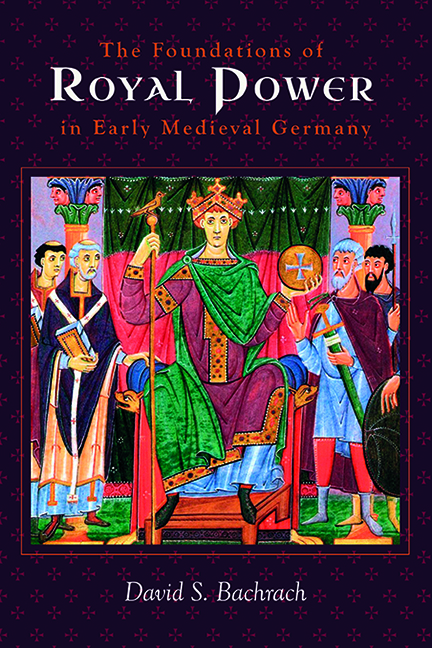 The Foundations of Royal Power in Early Medieval Germany
The Foundations of Royal Power in Early Medieval Germany Book contents
- Frontmatter
- Dedication
- Contents
- List of Illustrations
- Acknowledgments
- List of Abbreviations
- Maps
- Introduction
- 1 The Economy of Carolingian East Francia and Ottonian Germany
- 2 Material Assets of the Royal Fisc
- 3 Taxes, Tolls, and Other Regalian Rights
- 4 Ecclesiastical Resources at the Ruler’s Disposal
- 5 Toward an Analysis of Royal Expenditures: The Iter Regis and the Cost of Defense
- Conclusion
- Appendix 1 Fiscal Properties held by the Rulers of East Francia and Germany, 887–1106
- Appendix 2 Fortifications held by the Royal Government during the Reigns of Henry I and Otto I
- List of Key Terms
- List of Key Dates
- Bibliography
- Index
4 - Ecclesiastical Resources at the Ruler’s Disposal
Published online by Cambridge University Press: 16 July 2022
- Frontmatter
- Dedication
- Contents
- List of Illustrations
- Acknowledgments
- List of Abbreviations
- Maps
- Introduction
- 1 The Economy of Carolingian East Francia and Ottonian Germany
- 2 Material Assets of the Royal Fisc
- 3 Taxes, Tolls, and Other Regalian Rights
- 4 Ecclesiastical Resources at the Ruler’s Disposal
- 5 Toward an Analysis of Royal Expenditures: The Iter Regis and the Cost of Defense
- Conclusion
- Appendix 1 Fiscal Properties held by the Rulers of East Francia and Germany, 887–1106
- Appendix 2 Fortifications held by the Royal Government during the Reigns of Henry I and Otto I
- List of Key Terms
- List of Key Dates
- Bibliography
- Index
Summary
The previous two chapters have considered the resources provided to the royal government from estates held by the fisc and the taxes, tolls, and other regalian revenues and rights that derived from the authority held by the king by virtue of his office. A third, equally important, source of resources for the royal government was provided by the bishoprics and monasteries within the East Frankish and German kingdoms. Certain elements of ecclesiastical support for the crown, as distinct from spiritual and moral support of the king and kingdom through prayer, have garnered significant attention, often in the context of the historiographical construct of the Imperial Church System (German Reichskirchensystem). Notable in this context are the provision of logistical support for the itinerant royal court, which is denoted under the general rubric of fodrum and gistum, and the supply of military contingents for expeditionary military campaigns. Significantly less attention has been devoted to other aspects of ecclesiastical support for the royal government including the resources devoted to defensive military efforts, and the requisitioning of church lands and assets either to be held directly by the ruler or to be granted out as beneficia to help support royal officials. One further aspect of royal demands on and use of ecclesiastical assets concerns the government's role in imposing tithes as a universal tax. As will be discussed below, tithes provided an exceptionally important stream of revenue that served not only the specific interests of individual ecclesiastical institutions, but also was available in a variety of direct and indirect ways to the ruler as well. As has been true in the previous chapters, royal and ecclesiastical charters are the indispensible starting point for the discussion of royal use of the resources of individual churches, as well as the broadbased demands on “the Church” as a whole. Additional information is derived from historiographical texts, particularly the gestae of individual bishops and abbots, statutes of episcopal synods, as well as letters. The scale of the investments made by ecclesiastical officials in the construction of palaces, fortifications, and other public works, is made manifest in the considerable and growing body of archaeological studies.
- Type
- Chapter
- Information
- The Foundations of Royal Power in Early Medieval GermanyMaterial Resources and Governmental Administration in a Carolingian Successor State, pp. 181 - 230Publisher: Boydell & BrewerPrint publication year: 2022


